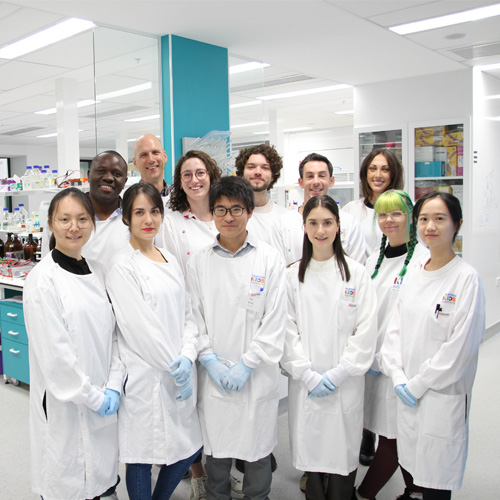Search
Research
Potassium Ion Channels in Malignant Central Nervous System CancersMalignant central nervous system (CNS) cancers are among the most difficult to treat, with low rates of survival and a high likelihood of recurrence. This is primarily due to their location within the CNS, hindering adequate drug delivery and tumour access via surgery. Furthermore, CNS cancer cells are highly plastic, an adaptive property that enables them to bypass targeted treatment strategies and develop drug resistance.
Research
Tumor Infiltrating Effector Memory Antigen-Specific CD8(+) T Cells Predict Response to Immune Checkpoint TherapyImmune checkpoint therapy (ICT) results in durable responses in individuals with some cancers, but not all patients respond to treatment. ICT improves CD8+ cytotoxic T lymphocyte (CTL) function, but changes in tumor antigen-specific CTLs post-ICT that correlate with successful responses have not been well characterized. Here, we studied murine tumor models with dichotomous responses to ICT.
Research
PPARalpha and PPARgamma activation is associated with pleural mesothelioma invasion but therapeutic inhibition is ineffectiveMesothelioma is a cancer that typically originates in the pleura of the lungs. It rapidly invades the surrounding tissues, causing pain and shortness of breath. We compared cell lines injected either subcutaneously or intrapleurally and found that only the latter resulted in invasive and rapid growth.

We think all kids with Sarcoma should be able to lead happy, healthy lives! To achieve this, we aim to discover and develop safer and more effective treatments by doing inventive and rigorous research. We focus on addressing high relapse rates using a combination of unique pre-clinical models, patient samples and systems immunology.

Research
Cancer CentreListed are all The Kids Research Institute Australia research teams involved in our Cancer Centre. This Centre sits under the Chronic and Severe Diseases research theme.
Research
Time-course RNAseq data of murine AB1 mesothelioma and Renca renal cancer following immune checkpoint therapyTime-critical transcriptional events in the immune microenvironment are important for response to immune checkpoint blockade (ICB), yet these events are difficult to characterise and remain incompletely understood. Here, we present whole tumor RNA sequencing data in the context of treatment with ICB in murine models of AB1 mesothelioma and Renca renal cell cancer.

News & Events
Premier’s Science Awards finalists recognised for work in physical activity, cancer and mental healthFour The Kids Research Institute Australia researchers from a diverse range of fields have been named as finalists for the prestigious 2022 Premier’s Science Awards.
Research
CD4+ T cells drive an inflammatory, TNF-α/IFN-rich tumor microenvironment responsive to chemotherapyWhile chemotherapy remains the first-line treatment for many cancers, it is still unclear what distinguishes responders from non-responders. Here, we characterize the chemotherapy-responsive tumor microenvironment in mice, using RNA sequencing on tumors before and after cyclophosphamide, and compare the gene expression profiles of responders with progressors.
Research
Development of a high-sensitivity and short-duration fluorescence in situ hybridization method for viral mRNA detection in HEK 293T cellsCoronavirus disease 2019 (COVID-19) is an extremely contagious illness caused by severe acute respiratory syndrome coronavirus 2 (SARS-CoV-2). Early disease recognition of COVID-19 is crucial not only for prompt diagnosis and treatment of the patients, but also for effective public health surveillance and response.
Research
Geldanamycin treatment does not result in anti-cancer activity in a preclinical model of orthotopic mesotheliomaMesothelioma is characterised by its aggressive invasive behaviour, affecting the surrounding tissues of the pleura or peritoneum. We compared an invasive pleural model with a non-invasive subcutaneous model of mesothelioma and performed transcriptomic analyses on the tumour samples.
